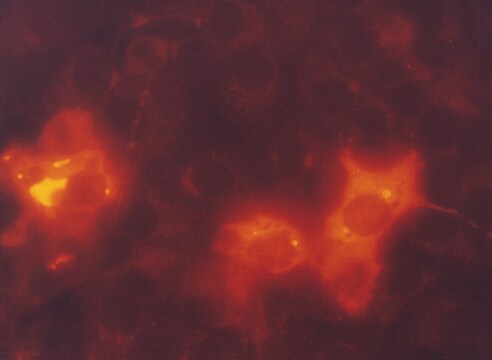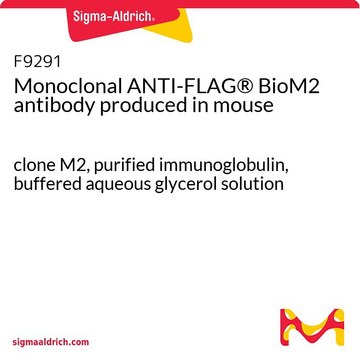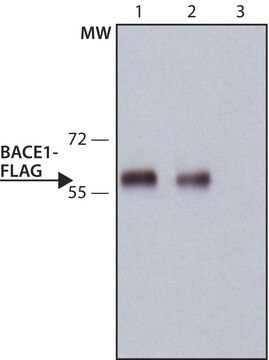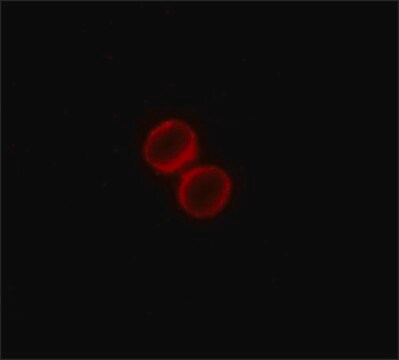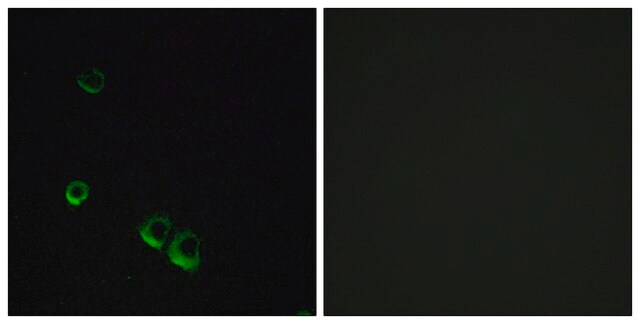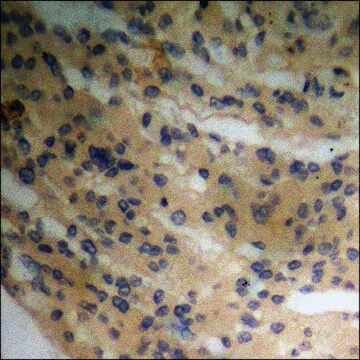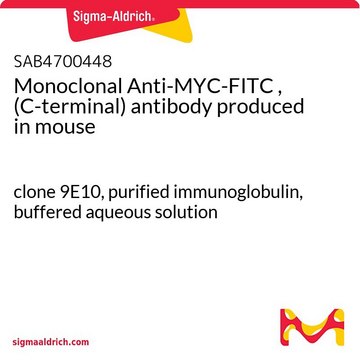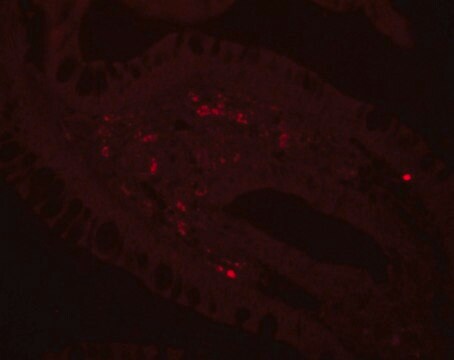おすすめの製品
由来生物
mouse
結合体
FITC conjugate
抗体製品の状態
purified immunoglobulin
抗体製品タイプ
primary antibodies
クローン
M2, monoclonal
フォーム
buffered aqueous solution
交差性
all
濃度
~1 mg/mL
テクニック
direct immunofluorescence: 10 μg/mL using mammalian cells fixed with methanol:acetone
アイソタイプ
IgG1
免疫原配列
DYKDDDDK
輸送温度
dry ice
保管温度
−20°C
類似した製品をお探しですか? 訪問 製品比較ガイド
関連するカテゴリー
詳細
抗FLAG M2抗体‐FITC標識はフラッグ融合タンパク質の検出に用いられます。このモノクローナル抗体はマウスで生産され、フルオレセインイソチオシアナート(FITC)に共有結合的に結合されます。この抗体はN末端、Met N末端、およびC末端のFLAGシーケンスを認識します。結合はカルシウム依存性ではありません。F4049はアフィニティ精製した抗体で、ほとんどのアプリケーションで感度が向上しています。
アプリケーション
抗体は免疫蛍光法、免疫細胞染色、免疫組織染色、免疫ブロット法、フローサイトメトリーおよび電子顕微鏡に適しています。二次抗体が交差反応性を起こす可能性のあるネズミ科動物でFlag融合タンパク質の検出が要求される場合の使用に理想的です。
製品の詳細についてはFLAG®アプリケーションポータルをご覧ください。
製品の詳細についてはFLAG®アプリケーションポータルをご覧ください。
物理的形状
10mM PBS溶液 (pH 7.4, 1% BSA, 0.1%アジ化ナトリウム含有)
法的情報
ANTI-FLAG is a registered trademark of Merck KGaA, Darmstadt, Germany
FLAG is a registered trademark of Merck KGaA, Darmstadt, Germany
適切な製品が見つかりませんか。
製品選択ツール.をお試しください
保管分類コード
10 - Combustible liquids
WGK
WGK 3
引火点(°F)
Not applicable
引火点(℃)
Not applicable
適用法令
試験研究用途を考慮した関連法令を主に挙げております。化学物質以外については、一部の情報のみ提供しています。 製品を安全かつ合法的に使用することは、使用者の義務です。最新情報により修正される場合があります。WEBの反映には時間を要することがあるため、適宜SDSをご参照ください。
Jan Code
F4049-VAR:
F4049-1MG:
F4049-VAR-N:
F4049PROC:
F4049-.2MG:
F4049-BULK-N:
F4049-BULK:
F4049-5X1MG:
この製品を見ている人はこちらもチェック
Pete Stavropoulos et al.
Journal of immunological methods, 362(1-2), 190-194 (2010-08-31)
The African trypanosome (Trypanosoma brucei) is transmitted by the bite of the tsetse vector to the mammalian bloodstream where it exists as a completely extracellular parasite. As a result of this exposure, the parasite elicits a robust immune response that
Xuechen Lv et al.
Protein & cell, 7(5), 325-337 (2016-04-18)
G protein-coupled receptors (GPCRs) are involved in all human physiological systems where they are responsible for transducing extracellular signals into cells. GPCRs signal in response to a diverse array of stimuli including light, hormones, and lipids, where these signals affect
Jing Yi et al.
PloS one, 8(10), e78144-e78144 (2013-11-10)
LGR4 is an R-spondin receptor with strong positive effect on Wnt signaling. It plays a critical role in development as its ablation in the mouse led to total embryonic/neonatal lethality with profound defects in multiple organs. Haplotype insufficiency of LGR4
Emmanuelle Despras et al.
Nature communications, 7, 13326-13326 (2016-11-05)
Translesion polymerase eta (polη) was characterized for its ability to replicate ultraviolet-induced DNA lesions that stall replicative polymerases, a process promoted by Rad18-dependent PCNA mono-ubiquitination. Recent findings have shown that polη also acts at intrinsically difficult to replicate sequences. However
Jun-ichi Asaka et al.
Molecular pharmacology, 71(6), 1487-1493 (2007-03-01)
Multidrug and toxin extrusion 1 (MATE1) has been isolated as an H(+)/organic cation antiporter located at the renal brush-border membranes. Previous studies using rat renal brush-border membrane vesicles indicated that cysteine and histidine residues played critical roles in H(+)/organic cation
資料
Glycan Labeling
ライフサイエンス、有機合成、材料科学、クロマトグラフィー、分析など、あらゆる分野の研究に経験のあるメンバーがおります。.
製品に関するお問い合わせはこちら(テクニカルサービス)


